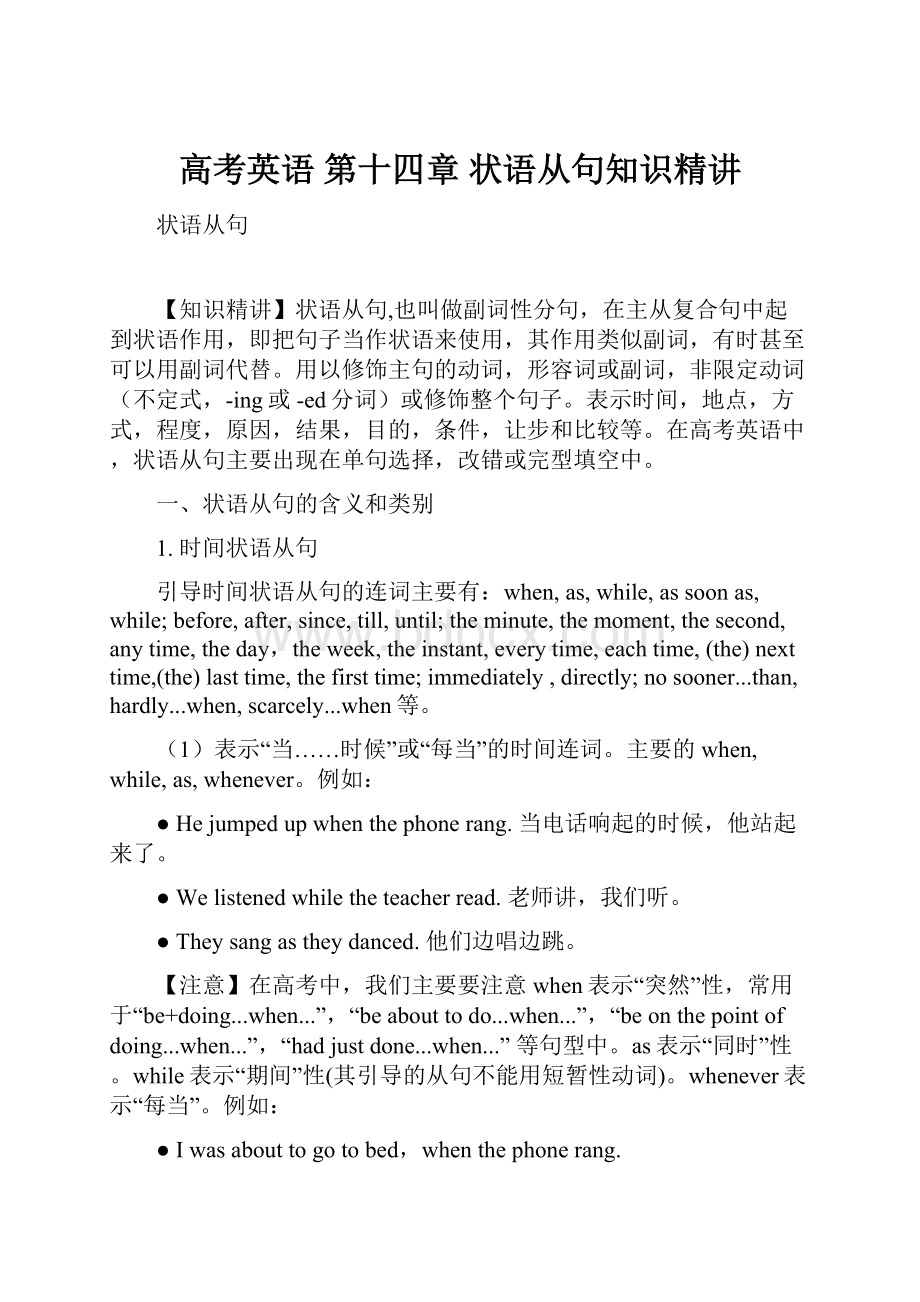高考英语 第十四章 状语从句知识精讲.docx
《高考英语 第十四章 状语从句知识精讲.docx》由会员分享,可在线阅读,更多相关《高考英语 第十四章 状语从句知识精讲.docx(17页珍藏版)》请在冰豆网上搜索。

高考英语第十四章状语从句知识精讲
状语从句
【知识精讲】状语从句,也叫做副词性分句,在主从复合句中起到状语作用,即把句子当作状语来使用,其作用类似副词,有时甚至可以用副词代替。
用以修饰主句的动词,形容词或副词,非限定动词(不定式,-ing或-ed分词)或修饰整个句子。
表示时间,地点,方式,程度,原因,结果,目的,条件,让步和比较等。
在高考英语中,状语从句主要出现在单句选择,改错或完型填空中。
一、状语从句的含义和类别
1.时间状语从句
引导时间状语从句的连词主要有:
when,as,while,assoonas,while;before,after,since,till,until;theminute,themoment,thesecond,anytime,theday,theweek,theinstant,everytime,eachtime,(the)nexttime,(the)lasttime,thefirsttime;immediately,directly;nosooner...than,hardly...when,scarcely...when等。
(1)表示“当……时候”或“每当”的时间连词。
主要的when,while,as,whenever。
例如:
●Hejumpedupwhenthephonerang.当电话响起的时候,他站起来了。
●Welistenedwhiletheteacherread.老师讲,我们听。
●Theysangastheydanced.他们边唱边跳。
【注意】在高考中,我们主要要注意when表示“突然”性,常用于“be+doing...when...”,“beabouttodo...when...”,“beonthepointofdoing...when...”,“hadjustdone...when...”等句型中。
as表示“同时”性。
while表示“期间”性(其引导的从句不能用短暂性动词)。
whenever表示“每当”。
例如:
●Iwasabouttogotobed,whenthephonerang.
●Justashecaughttheball,therewasatearingsound.
●WhileJohnwassittingbitinghisnails,Iwasworkingoutaplantogetushome.
(2)表示“在……之前(或之后)”的时间连词。
主要的有before,after。
例如:
●Turnthelightsoffbeforeyouleave.
●Hestartedthejobsoonafterhelefttheuniversity.
before是高考考查的热点词汇之一,其用法归纳如下:
【注意】表示“在……之后……才”。
强调某事发生得晚或慢。
TheAmericanCivilWarlastedfouryearsbeforetheNorthwonintheend.
【注意】表示“……还没来得及……就……”。
目的在于强调从句动作发生之前,主句动作已发生。
例如:
●BeforeIcoldgetinaword,hehadmeasuredme.
【注意】表示“在……之前就……”。
这时主句与before从句中的两个动作按时间先后依次发生。
例如:
●ItwaseveningbeforewereachedthelittletownofWinchester.
【注意】表示“趁……”,“等到……”,或“没等……就……”等。
例如:
●Hemadeamistake,butthenhecorrectedthesituationbeforeitgotworse.
【注意】before用于句型“It+will/wouldbe+时间段+before...”句型中,表示“要过多久才……”。
用于“It+maybe+时间段+before...”,表示“也许要过多久才……”。
其否定形式“Itwill/wouldnotbe+时间段+before…”表示“不久……就……,过不了多久就……”。
例如:
●Itwillbealongtimebeforewemeetthemagain.
【注意】用于句型“itwas+时间段+before...”表示“过了(多长时间)才……”。
其否定形式“itwasnot+时间段+before...”意为“不久……就……”,“没过(多长时间)就……”。
例如:
●Itwassometimebeforewerealizedthetruth.
(3)“自从”或“直到”的时间连词。
主要的有since,until,till。
例如:
●Hehaslivedheresincehegotmarried.
●Mostmenworkeduntil/tillthey’re65.
【注意】before与since,when,until引导的时间状语从句区别
“Itbe+时间段+since引导的时间状语从句”表示“自从……已经有多长时间了”。
主句用一般现在时或现在完成时。
“Itbe+时间点+when引导的时间状语从句”表示“某个动作发生时,是某个时间”。
主句谓语动词可以是一般过去时,或者一般将来时。
“It+will/wouldbe+时间段+before...”句型中,表示“要过多久才……”。
用于“It+maybe+时间段+before...”,表示“也许要过多久才……”。
“itwas+时间段+before...”表示“过了(多长时间)才……”。
主句谓语动词是一般将来时,过去将来时或者一般过去时。
until常用于“...until...”,“not...until...”中。
表示“直到……才……”。
在肯定句中,主句谓语动词是延续性动词。
●Itisalmostfiveyearssincewesaweachotherlasttime.
—DidJackcomebackearlylastnight?
—Yes.Itwasnotyeteighto'clockwhenhearrivedhome.
(4)表示“一……就……”的时间连词。
主要的有assoonas,once;nosooner...than,hardly/scarcely...When;immediately,directly,instantly;theminute,themoment,thesecond,anytime,theday,theweek,theinstant等。
例如:
●Tellhimthenewsassoonasyouseehim.
●Irecognizedherthemoment(that)Isawher.
●Oncehearrives,wecanstart.
【注意】nosooner...than,hardly/scarcely...when,句子要倒装。
例如:
●Ihadnosoonerclosedthedoorthansomebodyknocked.
●NosoonerhadIclosedthedoorthansomebodyknocked.
【注意】immediately,directly,instantly副词常常用作连词,相当于“assoonas”。
例如:
●Icameimmediatelyyoucalled.
●DirectlyIwalkedinthedoorIsmeltsmoke.
(5)表示“上次”、“下次”、“每次”等的时间连词。
主要的有everytime(每次),eachtime(每次),(the)nexttime(下次),anytime(随时),(the)lasttime(上次),thefirsttime(第一次)。
例如:
●LasttimeIsawhim,helookedill.
●Dolookmeupnexttimeyou’reinLondon.
【注意】everytime,eachtime,anytime前不用冠词,(the)nexttime,(the)lasttime中的冠词可以省略,而thefirsttime中的冠词通常不能省略。
名词结构做连词的结构特点。
【注意】the+瞬间名词
其中的瞬间名词主要包括moment,minute,instant,second等,其意为“一……就……”,相当于assoonas。
例如:
●Theminutehesawherhefellinlove.
●I’lltelephonetheminutethere’sanychange.
【注意】the+季节名词
其中的季节名词包括spring,summer,autumn,winter,其意为“在……的那年春天、夏天、秋天、冬天”。
例如:
●Hiswifelefthimthespringhewentabroad.
●Hesoldhishouseandwenttothesouththesummerhelosthisjob.
【注意】the+时间名词
其中的时间名词主要包括hour,day,night,week,month,season,year等,其意为“在……的时候、那天、那个晚上、那周、那个月、那个季节、那年”。
例如:
●Thehourhewasinheroffice,hefeltverysad.
●Thedayhereturnedhome,hisfatherwasalreadydead.
【注意】the+序数词+time(next,last也具有类似序数词的性质,因此也具有以上用法。
)
其中的序数词包括first,second,third,fourth等,其意为“当第几次……的时候”。
例如:
●Mygirlfriendbeatmeatpokerthefirsttimeweplayed.
●Nexttimeyoucomein,pleaseclosethedoor.
●Thelasttimewetalkedhesaidheneededanothertwodays.
2.地点状语从句
地点状语从句通常由where(在……的地方),wherever(无论什么地方),anywhere(无论何处)以及everywhere(到处)等连词来引导。
●WhereIlivethereareplentyoftrees.
●WhereverIamIwillbethinkingofyou.
●Makeamarkwhereveryouhaveanyquestions.
●WewillgowherethePartydirectsus.
【注意】在地点状语从句中,用现在时态代替将来时态。
●Everywhereyougo,youwillfindthesamething.
●Wherethereisawill,thereisaway.
●Wherethereisariver,thereisacity.
●WhereverIam,Iwillbethinkingofyou.
【注意】where引导定语从句时,从句前应有一个表示地点的名词作先行词;而状语从句前则无需先行词。
例如:
●Gobackwhereyoucamefrom.(where引导地点状语从句)
●Gobacktothevillagewhereyoucamefrom.(where引导定语从句,修饰village)
【注意】where引出的地点状语从句除表示地点外,还可以指处境等。
例如:
●Itisyourfaultthatsheiswheresheis.
【注意】地点状语从句的省略,例如:
●Fillintheblankswitharticlesnecessary.(necessary前省略了whereitis)
●Avoidstructuresofthiskindwhereverpossible.(possible前省略了whereveritis)
3.条件状语从句
条件状语从句常由if,unless=if...not,once,as/solongas,suppose/supposing(that),provided/providing(that),granted/granting(that),giventhat,let'ssay,letussay,say,oncondition(that)等词引导。
●Let'sgooutforawalkunlessyouaretootired.
●Iwillcomeproviding(that)Iamwellenough.
●Iwillgothereoncondiionthatyouaccompanyme.
●Supposingyouwereinmyshoes,whatwouldyoudo?
●Sayitweretrue,whatwouldyoudo?
●Granted/Grantingthathedidsayso,wecnnotbesurewhathereallymeant.
●Giventhatitistrue,whatshouldwedo?
●Youmayborrowthisbookaslongasyoukeepitclean.
【注意】在由if,unless,once,as/solongas等引导的条件状语从句中,用一般现在时表示一般将来时,用现在完成时表示将来完成时。
例如:
●Solongashecomeshere,I'llletyouknow.
【注意】unless=ifnot,"除非"本身有否定意思,有时两者可以换用,但是unless的语气更强些。
【注意】as/solongas的重点在于时间的延续性,由它引导的条件从句的谓语通常都表示动作或状态会延续一段时间。
【注意】在oncondition(that),suppose/supposing(that),let'ssay,letussay,sayassuming(that)等引导的条件状语从句中,如果假设的条件是不能实现的,就要用虚拟语气。
例如:
●Hecangooutoncondition(that)he(should)comehomebyfive.
●Supposeyourfathersawyounow,whatwouldhesay?
【注意】其他表示条件意味的句型:
祈使句/省略句+and…=if从句+主句,祈使句/省略句+or/orelse=unless从句+主句。
●Takeenoughmoneywithyou,andyoucanbuythedictionary.Runfast,oryou’llbelateforschool.
●Aotherattempt,andI'llmakeit.
4.原因状语从句
原因状语从句常由because,since,as,for,that...,notthat...butthat...,nowthat,inthat,seeingthat,consideringthat,onthegroundthat,forthereasonthat,byreasonthat等引导。
●Ididn’tgotoschoolyesterdaybecauseIwasill.
●Sinceeverybodyishere,let’sbeginourmeeting.
●Asyouareinpoorhealth,youshouldnotstayuplate.
●Inthatheisill,hefeelsunabletodoit.
●It'snotthatI'mdissatisfieed,butthatIhavemyownbusinesstoattendto.
●Now(that)youaregrownup,youshouldnotrelyonyourparents.
●Ilikethisplace,butIlikemyhometownbetterinthatIhavemorefriendsthere.
●Seeing(that)herefusedtohelpus,there’snoreasonthatweshouldnowhelphim.
●Considering(that)everybodyishere,let’sbeginourdiscussion.
●Janedivorcedhimon(the)groundsthathehadinfactdesertedherandthechildren.
【注意】在语气上,because最重,表示的是直接理由,回答why时只能用它,because引导的从句常常放在句末。
其次是since,as所提出的原因是已知的,或者是句中不甚重要的部分,since较as稍正式一些。
for所提出的只是对所谈内容的一种补充说明,因此for引导的句子不能放在句首,for也被认为是并列连词。
例如:
●Ashisflatisinalargetown,hehasnogardenofhisown.
●Sinceyoudon'ttrusthim,youshouldnotemployhim.
●Heseldomgoesoutnow,forheisveryold.
【注意】because还可以用just,only,simply,chiefly等副词来修饰,而且也经常用到这样的组合:
partlybecause...partlybecause(半是因为……,半是因为……),notbecause...butbecause...(不是因为……而是因为……)。
例如:
●Youshouldnotdespiseamanjustbecauseheispoorlydressed.
●Heresignedpartlybecausehewasold,andpartlybecausehewasboredwiththework.
●Ididn'thelphim,notbecauseIwasunwilling,butbecauseIwasunabletodoit.
【注意】关于not...because...结构:
该结构中的否定词有时否定主句,有时否定从句,一般要根据句子的意思作出正确或合乎逻辑的理解。
若not否定主句,最好在because之前用逗号,否则会引起歧义,如下句在没有特定上下文时就有两种解释:
Ididn’tgobecauseIwasafraid.我没有去是因为怕。
/我不是因为怕才去。
【注意】because习惯上不与so连用,汉语习惯上说“因为…所以…”,但英语习惯上却不能将so与because连用。
例如:
●Westayathomebecauseitisraining.
【注意】Because引导的原因状语从句有时可与becauseof短语转换:
例如:
●Hecan’tcomebecauseheisill.
●Hecan’tcomebecauseofhisillness.
●Isaidnothingaboutitbecausehiswifewasthere.
●Isaidnothingaboutitbecauseofhiswife’sbeingthere.
【注意】that...,notthat...butthat...,nowthat用来强调理由或根据。
【注意】inthat,seeingthat,consideringthat这三个在一般情况下可以交换使用,在其中inthat中,that不能省略,而且多出现在主句之后,在seeingthat,consideringthat中,that可以省略。
5.让步状语从句
让步状语从句由although,though,however,whatever,whoever,whomever,whichever,whenever,wherever,whether,nomatter(who,what,where,when,etc),evenif,eventhough等词引导。
(1)though,although表示“虽然,纵然”之意。
这两个连词意思大致相同,在一般情况下可以互换使用。
although引导的让步状语从句位于主句之前的情况较多,though引导的让步状语从句可位于主句之前或主句之后。
在口语中,though较常使用,although比though正式,二者都可与yet,still或nevertheless连用,但不能与but连用。
例如:
●Alhough/Thoughhewaswornout,(still)hekeptonworking.
●Although/Thoughheisveryold,(yet)heisquitestrong.
(2)as,though表示“虽然……但是”,“纵使……”之意。
as引导的让步状语从句必须以部分倒装的形式出现,被倒装的部分可以是表语、状语或动词原形,though间或也用于这样的结构中,但although不可